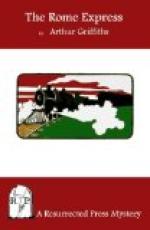“My name I have given you—Natale Ripaldi. I am a detective officer belonging to the Roman police.”
“What!” cried M. Flocon, colouring deeply. “This is unheard of. Why in the name of all the devils have you withheld this most astonishing statement until now?”
“Monsieur surely remembers. I told him half an hour ago I had something important to communicate—”
“Yes, yes, of course. But why were you so reticent. Good Heavens!”
“Monsieur was not so encouraging that I felt disposed to force on him what I knew he would have to hear in due course.”
“It is monstrous—quite abominable, and shall not end here. Your superiors shall hear of your conduct,” went on the Chief, hotly.
“They will also hear, and, I think, listen to my version of the story,—that I offered you fairly, and at the first opportunity, all the information I had, and that you refused to accept it.”
“You should have persisted. It was your manifest duty. You are an officer of the law, or you say you are.”
“Pray telegraph at once, if you think fit, to Rome, to the police authorities, and you will find that Natale Ripaldi—your humble servant—travelled by the through express with their knowledge and authority. And here are my credentials, my official card, some official letters—”
“And what, in a word, have you to tell us?”
“I can tell you who the murdered man was.”
“We know that already.”
“Possibly; but only his name, I apprehend. I know his profession, his business, his object in travelling, for I was appointed to watch and follow him. That is why I am here.”
“Was he a suspicious character, then? A criminal?”
“At any rate he was absconding from Rome, with valuables.”
“A thief, in fact?”
The Italian put out the palms of his hands with a gesture of doubt and deprecation.
“Thief is a hard, ugly word. That which he was removing was, or had been, his own property.”
“Tut, tut! do be more explicit and get on,” interrupted the little Chief, testily.
“I ask nothing better; but if questions are put to me—”
The Judge interposed.
“Give us your story. We can interrogate you afterwards.”
“The murdered man is Francis A. Quadling, of the firm of Correse & Quadling, bankers, in the Via Condotti, Rome. It was an old house, once of good, of the highest repute, but of late years it has fallen into difficulties. Its financial soundness was doubted in certain circles, and the Government was warned that a great scandal was imminent. So the matter was handed over to the police, and I was directed to make inquiries, and to keep my eye on this Quadling”—he jerked his thumb towards the platform, where the body might be supposed to be.
“This Quadling was the only surviving partner. He was well known and liked in Rome, indeed, many who heard the adverse reports disbelieved them, I myself among the number. But my duty was plain—”




